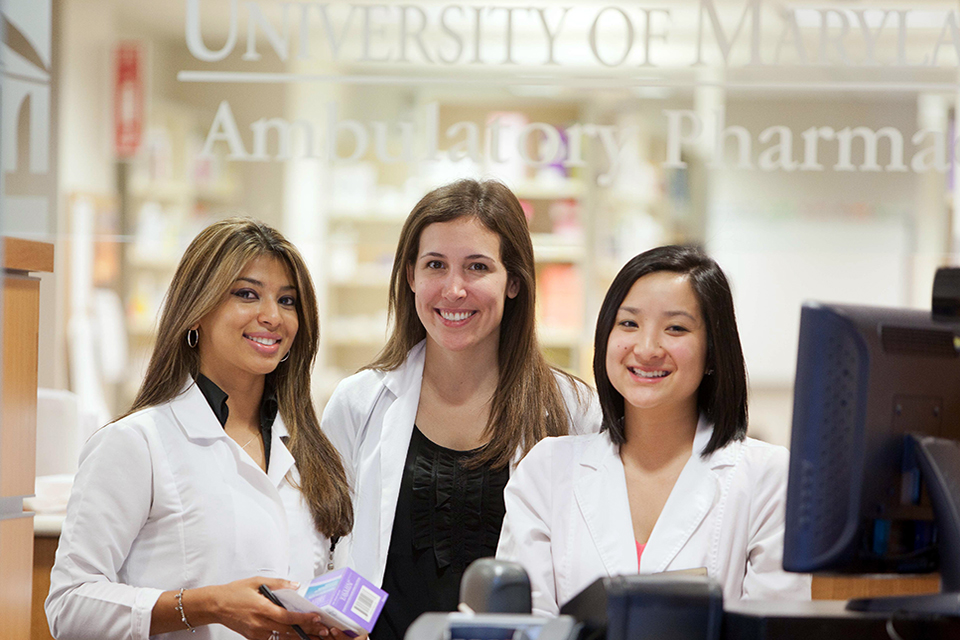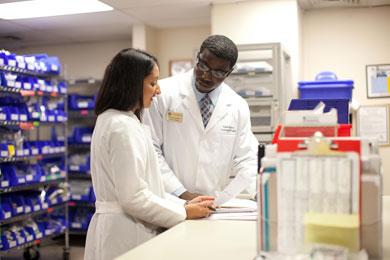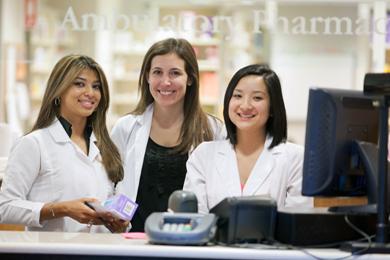UMSOP Students Have “Stellar” Success on Pharmacy Residency Match Day
With highest match success rate in the country, School of Pharmacy fourth year students learn where they will spend the next year of their training.
By Becky Ceraul
April 14, 2015
On March 20, thousands of fourth-year student pharmacists across the country waited with bated breath as the American Society of Health-System Pharmacists (ASHP) announced its Residency Match Day results. At the University of Maryland School of Pharmacy, 52 student pharmacists learned their fate as they matched to residency positions at institutions such as Johns Hopkins Hospital, Veterans Affairs San Diego Healthcare System, Oregon Health and Science University, Kaiser Permanente, and Yale-New Haven Health System.
“I am thrilled by the stellar success rate the School had in the residency match program this year,” says Natalie D. Eddington, PhD, professor and dean of the School of Pharmacy and executive vice president for University regional partnerships. “The University of Maryland School of Pharmacy has achieves its highest success rate with this year’s match, with 52 students matching to post graduate year (PGY) 1 positions across the country, which is an 84 percent match rate. Among the Big 10 pharmacy schools, we were third in total PGY1 matches and were eight in total PGY1 matches among all pharmacy schools in the country. These are truly impressive statistics. I offer my congratulations to each of our students who matched and thank our many faculty and staff who worked with students to prepare them for residency interviews.”
“Pharmacy residencies offer students a great opportunity to continue developing their knowledge and skills in an environment where they can be closely mentored by pharmacy professionals,” says Cherokee Layson-Wolf, PharmD, CGP, BCACP, FAPhA, associate dean for student affairs and associate professor in the Department of Pharmacy Practice and Science (PPS). “The number of employers that require applicants to have one or two years of advanced training beyond the completion of their Doctor of Pharmacy (PharmD) degree continues to grow. To stay competitive in this advancing job market, students now actively seek opportunities to pursue residency training.”
Over the years, pharmacy students have shown an increased interest in residency training to help them obtain more specialized roles within the health-system setting. In 2010, 22 percent of graduates from the School of Pharmacy went on to pursue residency or fellowship training. In 2014, that percentage increased to 29 percent.
One of the 52 fourth-year student pharmacists at the School of Pharmacy to receive a residency match this year was Brittany Palasik, who will be doing a PGY1 general practice residency at West Virginia University in Morgantown.
“Pursuing a residency position will give me the experience I need to achieve my career goal of becoming a clinical faculty member at a school of pharmacy,” she says. “It will also prepare me to function independently as an essential member of a multidisciplinary health care team to optimize pharmacotherapy and patient outcomes.”
Palasik says that the School of Pharmacy curriculum has prepared her for the challenges of a residency. “The School of Pharmacy’s faculty members are experts in their fields and in the area of evidence-based medicine, which will be essential for me in making recommendations to the health care team and in choosing the best medication regimen for each of my patients. Also, the School provides an experiential learning curriculum that is vital to learning how to practice independently as a resident and as a pharmacist. I have had valuable experiences with preceptors who have mentored and coached me and given me the tools I need to succeed as a hospital resident.”
Rilwan Badamas, another fourth-year School of Pharmacy student, matched to a PGY1 pharmacy practice residency at the Mayo Clinic in Florida. He also credits his education at the School for his success in the match. “The residency elective the School offers in the third year of the program enabled me to plan ahead for the residency application and interview process,” he says. “Through that elective, the guidance I received from my faculty advisor, Dr. Kristin Watson, and the preparation the School’s Job Ready Program provides in terms of CV review, letter of intent review, and mock interviews, I felt adequately prepared for the match process.”
The School of Pharmacy’s joint Residency Program with the University of Maryland Medical Center (UMMC) also had a successful match. Eighteen first- and second-year residents and fellows will join or continue in the program in July to advance their knowledge and skills in a number of specialty areas, including ambulatory care, cardiology, geriatrics, pain and palliative care, and psychiatry. “We also have two new fellows joining the program and our toxicology and instructional design fellows will be entering their last year of training in July,” says Kristin Watson, PharmD, BCPS, AQ Cardiology, associate professor in PPS and coordinator of the Residency and Fellowship Program at the School of Pharmacy.
Kaitlin Pruskowski is a current PGY1 pharmacy resident at Johns Hopkins Bayview Medical Center in Baltimore. She matched to the School’s joint PGY2 Critical Care Residency with UMMC. “The University of Maryland Residency and Fellowship Program offers everything I am looking for in a PGY2 critical care residency program. It offers a broad range of critical care experiences and rotations, a strong foundation in cutting edge medicine and history of education and service to the community. “
“Our residency and fellowship programs offer innovative educational, research, and practice settings in which residents and fellows can gain the knowledge and skills they need to become successful practicing pharmacists and obtain competitive positions in their respective specialties,” says Watson. “We are tremendously proud of this year’s successful match, and look forward to meeting all of our new residents and fellows this summer.”



